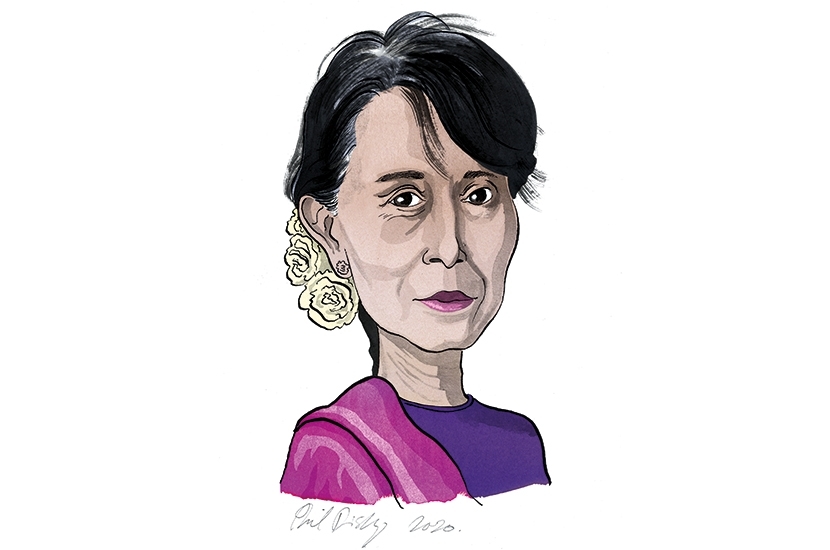Coup? What coup? The early morning takeover of Myanmar on Monday by the Tatmadaw (Burmese army) barely deserves the name. The word ‘coup’ suggests that Myanmar was being ruled by a civilian and democratic government before now. It was not.
Although Aung San Suu Kyi’s National League for Democracy won a landslide victory in ‘free’ elections in 2015, the constitutional revision implemented by the military in 2008 meant that Tatmadaw retained 25 percent of seats in both houses of the national assembly. More pertinently, whatever the outcome of elections, Tatmadaw reserved its rights to three ministries: home affairs, border affairs and defense.
Furthermore, in a move aimed squarely at Suu Kyi, who was married to the Oxford academic Michael Aris, Burmese citizens were barred from a presidential position if they were married to a foreigner. Although The Lady, as she became known, skirted around this problem by awarding herself the title State Counsellor and nominated her confederate Win Myint as president, nevertheless it has always been clear that real power lay outside the national assembly.
So if Tatmadaw held the reins of power, why did they bother to remove her? The trigger seems to have been the outcome of November’s election. The NLD’s refusal to account for ‘no-name’ votes particularly riled the military. The Lady, famed for her stubbornness, forgot that for Myanmar’s military leaders she was the mise-en-scène not the play itself, let alone the director. The purpose of The Lady’s release from her ‘ivory tower’ confinement in 2010 was to relieve Myanmar of its pariah status in the West and encourage foreign investment. But Asian politics has moved on. For the Tatmadaw, her usefulness as a palliative for its regime has been removed.
Since her election victory in 2015, Suu Kyi, with her ‘butter-wouldn’t-melt’ Audrey Hepburn looks, was the darling of the global liberal elite. When the myth met the reality of power, albeit nominal, a car crash was inevitable. It was on the issue of the alleged genocide of the Muslim Rohingyas that The Lady’s star fell. In fact, the situation was much more complicated than the narrative presented by western media. After the August 2017 uprising by the jihadist Arakan Rohingya Salvation Army in Myanmar’s Rakhine State, the Tatmadaw responded with a heavy crackdown. Many atrocities were committed, sometimes not by the army but by ultra-nationalist Burman militias.
The Rohingya population fled across the border to Bangladesh. The United Nations, NGO groups and the world’s liberal press portrayed this tragedy as an act of genocide by Myanmar’s government, which was subsequently brought to the International Court of Justice in The Hague. Suu Kyi, who in any case had zero leverage over Myanmar’s army, refused in her testimony to support the narrative that erased the role of the Rohingya jihadists in the unfolding humanitarian crisis. She was crucified in the global media and stripped of her many awards.
Does the disapproval of the West matter to the Tatmadaw? Hardly. China’s presence has become ever more dominant in south-east Asia. Obama’s abandonment of the South China Sea to Xi Jinping’s installation of fortified islands, combined with the increasing economic dominance of China’s investment in the region, have diminished America’s influence. Hard as it may be for the new US administration to swallow, south-east Asian countries, in the words of one Myanmar watcher, ‘don’t give a stuff about the West’.
In Myanmar itself, in 2018, 82 of 113 investment projects in the Rangoon region were Chinese. China and Myanmar have signed a deal to establish a 1,000-mile economic corridor from China through Mandalay and Rangoon before turning westward to the Kyaukphyu Special Economic Zone where a Chinese port is already under construction. China, albeit on friendly terms with Suu Kyi, is pragmatically neutral in dealing with its neighbors’ internal politics as long as they present no danger to its interests. Indeed, last year when Xi Jinping met Min Aung Hlaing, commander-in-chief of defense and de facto head of state in Myanmar, China’s state news agency, Xinhua, published a ‘heads of state’ photograph of the pair. It is unlikely that The Lady was removed without a nod from Xi. Not surprisingly China has blocked any UN censure of the coup.
As for the West’s media, the ‘coup’ presents an embarrassing choice. Does it continue to decry her failure to support the Rohingya genocide narrative or does it revert to the myth of the imprisoned ‘princess in the tower’? Most likely it will protest the ‘coup’ and quietly move on.
This article was originally published in The Spectator’s UK magazine. Subscribe to the US edition here.


















